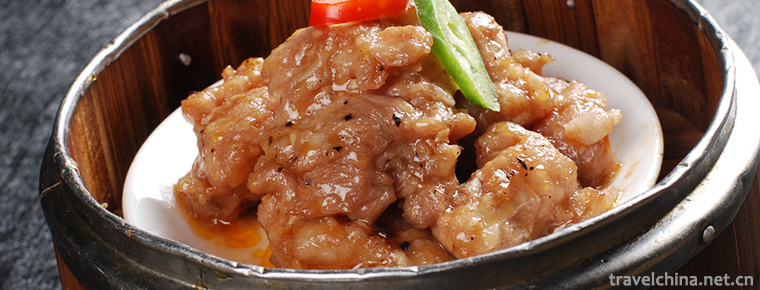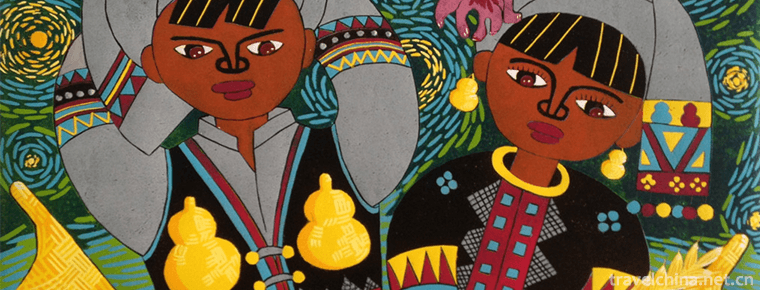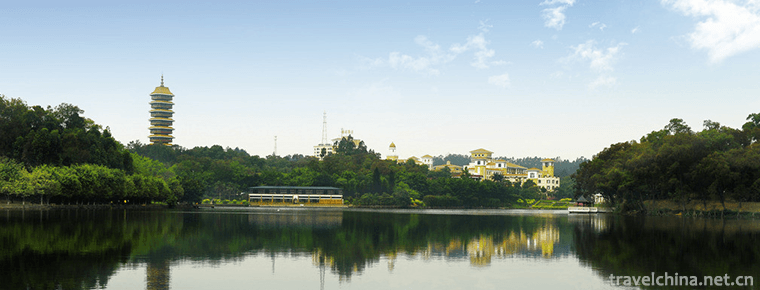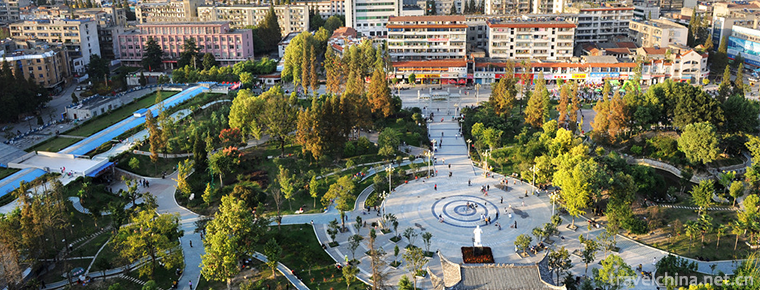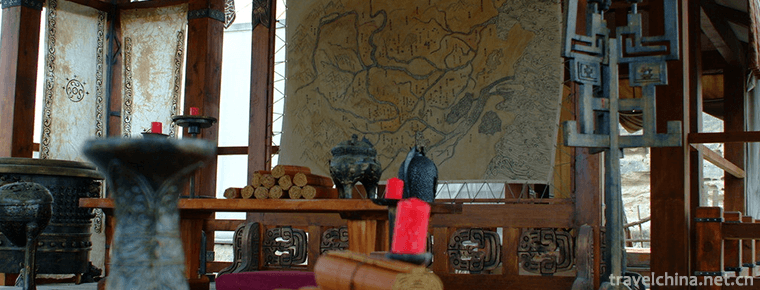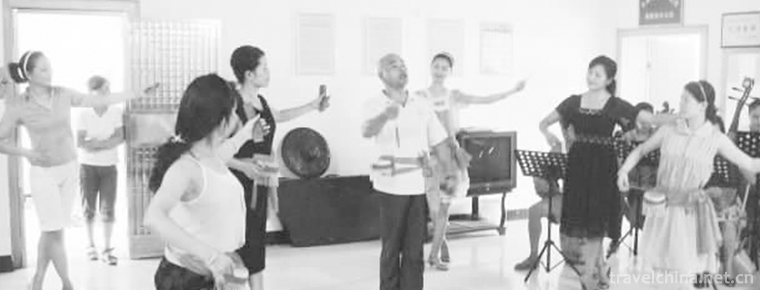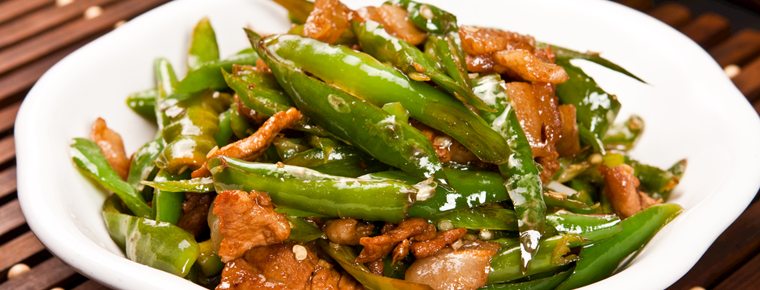a kind of Shanxi opera
a kind of Shanxi opera
Shangdang Bangzi, Shanxi Province's local traditional drama, one of the national intangible cultural heritage.
Shangdang Bangzi is one of the four Bangzi in Shanxi Province. It is popular in the two cities of Shanxi Province, namely, the Minister of southeastern Shanxi Province and Jincheng City (formerly known as Luan and Zezhou prefectures). It had been popular in the middle and late Qianlong period of Qing Dynasty. During the years of Jiaqing and Daoguang, classes and associations were established, famous actors emerged in succession, dramas appeared in competition, schools emerged, and entered a period of vigorous development. Shangdang Bangzi mainly sings Bangzi tune, concurrently singing Kunqu opera, Pihuang, Luoluo tune and circus opera, commonly known as "Kunbanluo Rohuang". Its high-pitched and lively tone has the characteristics of rude and healthy peasant art.
On May 20, 2006, Shangdang Bangzi was approved by the State Council of the People's Republic of China to be included in the first batch of national intangible cultural heritage list. Heritage No. IV-21.
historical origin
origin
There are many theories about the origin of Shangdang Bangzi. One is that it was formed in Zezhou Prefecture (Jincheng, Shanxi Province today), and the other is that it originated in the area of Changzhi, Shanxi Province. Although known as Bangzi, it is actually Kunqu (Kunqu Opera), Bangzi (Bangzi), Luo (Luoluo Opera), Volume (Cinema), Spring (Leather Spring) performing in the same stage with five tunes. Pu Opera has influenced its formation, but it is quite different from the other three Bangzi in the province. Shangdang Bangzi is an ancient opera. Some people say that class clubs appeared in the late Ming Dynasty, but no historical facts have been found. The earliest recorded is Kunqu Opera: the stage of Dawangmiao in Shangfucun Village, Yangcheng, Jincheng City, with the inscription wall of Baishun Band performing on September 16, 1658, in the fifteenth year of Shunzhi in Qing Dynasty. The songs of "Spring Lantern Riddle", "Enkou" and "Shuangbao Ji" are all Kunqu Opera or Yiqiang Opera repertoire. According to the more than 40 inscriptions on the stage between Kang and Qian Dynasty, Shangdang Bangzi was a mature opera with five tones by the middle of the 18th century.
One of the early professional classes in Shangdang Bangzi was Mingfeng Class in Zezhou Prefecture. According to the remnant tablet of Qinglian Temple in Jincheng City, a Mingfeng class singing Dangbangzi was founded around the fiftieth year of Qianlong (1785). This Mingfeng class is an earlier class society known as Shangdang Bangzi. Jincheng Qinglian Temple Daoguang nine years (1829) inscription: "There are Mingfeng Ban, more than 40 years of acting." It is said that in the late Ming Dynasty, there was a woman named "Fengxian" in Yangcheng, Jincheng City, who loved opera since childhood. When she got married, she married a family name Shi in Jincheng City, and together with the family name Shi called Ao Ming, she set up a theater troupe, named Ming Feng Ban after each of them. In 1959, it was found that on the screen of the Buddhist Hall in Qinglian Temple in Jincheng, there were 23 performances written by Mingfeng Ban on October 15, 1831, in Daoguang Eleventh Year (Daoguang), among which Caixianqiao, Shuangguan and Da Zifu were all traditional performances of Shangdang Bangzi. During the Daoguang period of the Qing Dynasty, there were more and more big theatre troupes in Shangdang area. These troupes developed rapidly, and gradually formed a unique style and melody of Shangdang Bangzi, and trained some well-known actors.
Rise and fall
The period between Xianfeng in Qing Dynasty and before the Anti-Japanese War (1815-1937) was the heyday of Shangdang Bangzi. In the late Qing Dynasty, Huguan's "100,000 Classes" performed in Beijing and Southwest Shandong. During this period, there were more than 200 professional class societies with thousands of repertoires in this opera genre, which created Zhao Qinghai, who is known as the king of the opera generation, as well as medium-sized actors such as Lang Buxiang, Shen Hui Donkey, Cao Huo Zhu, Du Qi, Jin Bolu, Feng Guorui, Wang Fucheng, Duan Ermiao, Guo Jinshun, Shen Yindong, Zhao Dejun (Jinwei), Wen Xiyun and Xu Zhi. Later, because of the warlords'scuffle, the people did not have enough time to live, and fewer acting days, Shangdang Bangzi declined day by day. After the July 7th Incident, the professional class club basically stopped its activities.
In 1934, Zezhou artists first went to Taiyuan to perform, known as "Shangdang official tune".
In the early days of the War of Resistance Against Japan, the Eighth Route Army led by the Communist Party of China and the Shanxi New Army marched into southeastern Shanxi, creating Taihang and Taiyue base areas, bringing new vitality to Shangdang Bangzi. Zhao Shuli, the author of the Taihang Mountains, loved and attached great importance to Shangdang opera art, created the modern opera Wanxianglou, created and adapted the ancient costume opera Yegong Tu and Han Yuniang, which carried forward national integrity, exposed treacherous and false forms, and stimulated the spirit of resistance. They were performed by Wuxiang County Guangming Opera Troupe, Xiangyuan County Rural Opera Troupe, and were very popular with the audience. Next, "Little Two Black Marriage", "Wang Gui and Li Xiangxiang", "Three Days Zhujiazhuang", "White Haired Girl" and "Blood and Tears Enmity" were also performed by the Bangzi Theatre Troupe of the Shangdang Party. From the late Anti-Japanese War to the War of Liberation, Shangdang Bangzi Theatre Troupes were set up in southeastern Shanxi Province, which retained and nurtured a number of artistic backbones for future prosperity and development.
In 1959, the name "Shangdang Bangzi" was proposed by Mr. Cai Hansheng.
According to incomplete statistics in 1965, Shangdang Bangzi has 700 plays (of which more than 600 are Bangzi, 90 are Pihuang, more than 10 are Kunqu Opera, Luoluo Opera and Cinju Opera respectively). There are more than 400 scripts in existence. Most of these plays are bold, simple and healthy, with their own characteristics. Among them, there are many plays about Yang Jiajun and Yue Jiajun. "Running Youzhou", "Yanmen Pass", "Sanguan Banquet" and other representative plays. After being assisted by Comrade Zhao Shuli, Sanguan Dinner was put on the screen in 1962. During the "Cultural Revolution", Shangdang Bangzi was severely destroyed. After the crushing of the Gang of Four, a new series of dramas emerged, such as "Village Suppliers and Salesmen", "Junma Ling", "Killing Wife", "Returning Prints", "Borrowing Grain", "Two Local Home Books", "Xishi" and "Qiaohui Rainbow Neon".
Distribution area
In the process of development, Shangdang Bangzi formed two factions: Lufu and Zefu (also known as Chuandi).
The Lufu School is mainly popular in Changzhi, eldest son, Xiangyuan, Tunliu, Licheng, Lucheng, Huguan, Pingshun 8 counties and Qinxian, Wuxiang and Qinyuan 3 counties under the jurisdiction of Yuanqin Prefecture. The earliest representative class clubs are "Sanyi Class" and "Happy Class". Sanyi class is more flexible, singing Yuejia will play more; willing to bang more rigorous rules, singing Yangjia will play more.
The Zefu School was mainly popular in Fengtai, Gaoping, Yangcheng, Lingchuan and Qinshui counties under the jurisdiction of Zezhou Prefecture in Shanxi Province. "Ming Feng Ban" and later Gaoping "Three Happiness" (commonly known as Dongzhai Opera) and "Trillion Ban" belong to this school. Fengtai's Ming Feng Ban ranks first steadily. Later, Gaoping's "Three Happiness" and "Trillion Ban" have all been outstanding for a while. Its characteristics are more stable and euphemistic, and strong lyricism.
In addition, Shangdang Bangzi in Heze area of Shandong Province and Yongnian County of Hebei Province, there are two sister operas of Shandong Zaobao and Hebei Xidiao.
Inheritance and Protection
Inheritance value
Academic value
In the local operas of northern China, Shangdang Bangzi's vocal characteristics are very obvious. Its rich repertoire and its dependence on folk cultural life, especially the coexistence of the suffering of five kinds of voices, are rare in the country. Now, Kun, Luo and Cinema have disappeared from the stage. Except for a small number of Shangdang Leaf Springs, most of them are Shangdang Bangzi plays.
Practical value
The protection and inheritance of Shangdang Bangzi will play an important role in enriching the spiritual and cultural life of the people in southeastern Shanxi, improving the quality of the people and building a harmonious society.
Current situation of inheritance
Due to the impact of modern culture and economic tide, the audience of Shangdang Bangzi has lost a large number, the performance level has gradually declined, many theatre troupes have been forced to disband, the successor talent is scarce, and the future of the troupe is worrying, so it is urgent to take measures to support and protect it.
Heritage figures
Ma Zhengrui, male, Han nationality, born in Zezhou, Shanxi in 1939. The second batch of national intangible cultural heritage project representative successors, Shanxi Province Jincheng declaration. Declaration items: Shangdang Bangzi.
Wu Guohua, female, Han nationality, born in October 1958 in Gaoping City, Jincheng City, Shanxi Province. The third batch of national intangible cultural heritage project representative successors, Shanxi Province Jincheng declaration. Declaration items: Shangdang Bangzi.
Zhang Aizhen, female, Han nationality, born in May 1959 in Gaoping City, Jincheng City, Shanxi Province. The third batch of national intangible cultural heritage project representative successors, Shanxi Province Jincheng declaration. Declaration items: Shangdang Bangzi.
Zhang Baoping, male, Han nationality, born in January 1961 in Qinshui County, Jincheng City, Shanxi Province. The third batch of national intangible cultural heritage project representative successors, Shanxi Province Jincheng declaration. Declaration items: Shangdang Bangzi.
Zhang Zhiming, male, Han nationality, born in 1956, is from Changzhi City, Shanxi Province, Changzi County. The third batch of representative inheritors of national intangible cultural heritage projects, the governor of Shanxi Province, declared. Declaration items: Shangdang Bangzi.
protective measures
The implementation of Shanxi Cultural Department's strategic decision to revitalize Shanxi Opera has reached a new stage: Shangdang Bangzi Tune of Shanxi Province's revitalization in 1988 was held in Jincheng City in 2014. This performance is to summarize and exchange the experience of revitalizing Shangdang Bangzi in recent years, further promote the comprehensive management of Shangdang Bangzi, so as to expand the audience of the ancient operas and serve the construction of two civilizations.
social influence
Honorary recognition
Shangdang Bangzi Theatre Troupe in Changzhi City of Shanxi Province has won high praise from the audience in the old area of southeastern Shanxi Province. It has participated in many national, provincial and municipal art competitions, and won many awards, such as "Peony Award", "Red Mei Award" and "Five-One Project Award" of Shanxi Province.
In 2018, at the Invitation Exhibition of Chinese Tongxiang Opera Art, Jincheng Shangdang Theatre Research Institute participated in the exhibition of "Between One Nian" and "Fang" which won five awards: excellent performance repertoire, excellent director, excellent scriptwriter, excellent composition and excellent actor.
Important activities
In 1956, Changzhi District organized a performance troupe to Beijing to perform in Beijing. This is a planned move by Shangdang Bangzi, which has been praised by experts and audiences in Beijing.

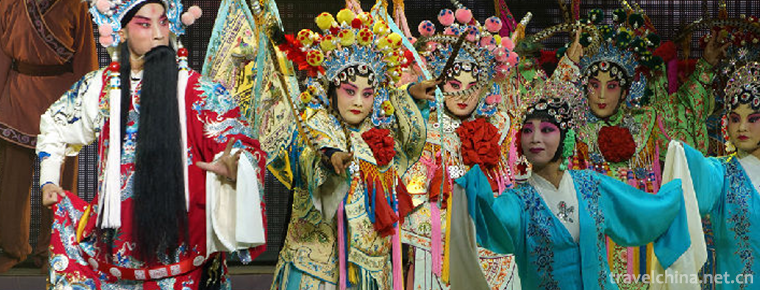
-
Black bean steamed pork ribs
Steamed pork ribs with lobster sauce is a traditional dish with color, aroma and taste. It belongs to Guangdong cuisine department. Cut the chopped pork ribs and add the marinade.
Views: 247 Time 2018-11-02 -
Mupa Mipa
Mupa Mipa, a local traditional folk literature in Simao City, Yunnan Province, is one of the national intangible cultural heritage..
Views: 348 Time 2018-12-15 -
sanshui forest park
Sanshui Forest Park is located in the north suburb of the southwest town of Sanshui District, Foshan City, Guangdong Province..
Views: 142 Time 2018-12-18 -
Zhongshan Park
Zhongshan Park is located in the south of the Forbidden City (Palace Museum) in the center of Beijing, west of Tian'anmen, and separated from the Palace Museum..
Views: 117 Time 2018-12-22 -
Mudan River Side Wall
The Mudanjiang Side Wall was built in the Tang Dynasty, presumably at the junction of Mudanjiang City in Heilongjiang Province and the northeast of Hailin County. .
Views: 287 Time 2019-02-07 -
Niulang and Zhinu Scenic Spot
Niulang Zhinu Scenic Area is located in Yanya Town, southeast of Yiyuan County, Shandong Province, 15 kilometers away from the county town. The scenic area is mainly composed of Daxianshan Mountain.
Views: 387 Time 2019-02-07 -
Yongxin Drum
Yongxin Xiaogu is one of the traditional operas in Ji'an City, Jiangxi Province, which originated from Taoism. Legend has it that it was formed in Yongxin, Jiangxi Province during the reign of Qingdao.
Views: 177 Time 2019-07-14 -
China West Normal University
Xihua Normal University is a key university in Sichuan Province. The school was founded in 1946 and began at the National Northeast University during the Anti-Japanese War. At the beginning of the Ant.
Views: 216 Time 2019-08-31 -
Fried meat with chili
Stir fried meat with chili is a dish made with chili and streaky pork as the main ingredients and soybeans, garlic seeds, soy sauce, oil salt, monosodium glutamate and ginger as auxiliary ingredients..
Views: 212 Time 2020-03-18 -
Chengdu Metro Line 1
Chengdu Metro Line 1 is the first metro line to be completed and put into operation in Chengdu, Sichuan Province, China. It is the first metro line opened in Western China. The first phase of the project was opened on September 27, 2010, The phase II project (Century City station to Guangdu station) .
Views: 116 Time 2020-11-28 -
Social security in Deyang
In 2018, there were 748000 employees participating in basic endowment insurance, 345000 in unemployment insurance, 752000 in medical insurance, 384000 in industrial injury insurance and 399000 in maternity insurance. In the whole year,.
Views: 338 Time 2020-12-14 -
Guangan secondary industry
In 2019, the industrial added value of Guang'an City will reach 28.87 billion yuan, an increase of 8.8%, and its contribution rate to economic growth will be 34.9%. At the end of the year, there were 597 Industrial Enterprises above Designated Size, and.
Views: 162 Time 2020-12-19
